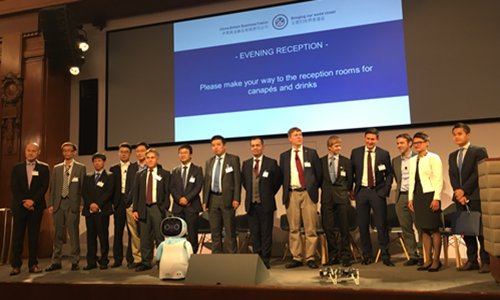
Talents in the AI area from both countries attend the China-Britain AI Summit at The Institute of Engineering and Technology in London on Friday. [Photo: Global Times]
Players in artificial intelligence (AI) from China and the United Kingdom came together at the China-Britain AI Summit on Friday in London.
Organized by the China-Britain Business Fusion, the summit illuminated the AI landscape in both China and the UK and catalyzed commercial business and investment opportunities.
The summit showcased innovative British and Chinese robotics, machines and deep learning technologies. It also covered the topics of AI ethics and social implications, the AI landscapes in China and the UK as well as the role of AI/smart technologies in the China-proposed Belt and Road initiative (B&R).
BRITISH AI ATTRACTS CHINESE INVESTORS
The demand for the China-Britain AI Summit, the first event of its kind, arose from developments in the Chinese and British AI space.
Mark Hedley, Director of ICT Sector at China-Britain Business Council, told the Global Times, "A lot of Chinese companies are coming here to establish R&D bases in order to access talents and technology, and [then] bring back to China."
The UK boasts five out of 2017's top 25 global universities, the only EU country to appear in the ranking. These five world-class universities have created a pool of AI expertise and entrepreneurs, thirsty for capital and investment.
British AI technologies remain highly attractive to Chinese investors. Bill Li, CEO of AMY Robotics Co. Ltd, told the Global Times, "We are planning to set up a new R&D center in London to serve as a gateway to EU markets."
AMY Robotics is a technology company based in Hangzhou, capital of East China's Zhejiang Province, with regional branches across the globe and R&D centers elsewher in China and the US.
Li said AMY Robotics is currently cooperating with Imperial College London on setting up the new R&D center there. He believes the center will complement the company's other two centers in China and the US.
"Britain is advanced in brain-computer interface technology and medical robots, just to name a few," Li said, adding that he values these advantages.
Apart from the talent pool and advanced technologies, Mark Hedley believes that as the UK has a mature legal environment, it's easier to do business there than in many other markets, and the economy is still relatively stable despite Brexit.
"The knowledge industry, high-tech industry, and innovation-focus areas are not hugely affected in a post-Brexit UK, provided the EU funding [for research and projects in these areas] will be replacd by UK funding," Hedley said, adding that he hasn't seen any decrease in appetite of Chinese investors in such areas.
Hedley believes that there's synergy between the UK and China with regard to strength in innovation and that China is a market of application for AI.
Major Chinese companies, such as Alibaba, Tencent and Lenovo, have already set up divisions for AI exploration and development.
Bill Li said, "AI and robotics are moving rapidly from academic research into the real world…we are entering a new era of robotics and AI, which is changing our world."
AMY Robotics aims to improve quality of life through autonomous service robots, which can be deployed for both personal use and in a diverse range of fields such as healthcare, education, finance, public service and retail.
China's advantages lie in the efficient application of new AI technology, Li said, adding that local companies scramble to experiment with new ideas and benefit from the country's huge user base.
NEW DIGITALIZED EConOMIES
The Chinese leadership has identified AI as one of the key investment focuses that could fuel economic growth as the country adjusts to the "new normal."
The Chinese government has approved plans for China to become the world market leader in AI by 2030, with the aim of making the industry worth $150 billion by 2020, according to the State Council's plan published this July.
Professor Jeremy Watson CBE, President of the Institution of Engineering and Technology, whose main offices are based in the UK, said, "The Chinese leadership plans to leverage AI to address a range of economic, governance and societal challenges aiming for AI to serve as a 'new engine' to advance future economic development through unleashing a new industrial transformation."
AI is also important to the one trillion dollar B&R initiative, which is primarily an economic development program. Originally announced in 2013, B&R requires huge amounts of world-leading smart technologies. It will connect the world not only physically but also digitally, transporting goods, services, people, information and ideas.
Lying at the western end of the B&R route, the UK was described as a "natural" trade partner for China by Britain's Chancellor of the Exchequer Philip Hammond when he visited the country earlier this year.
The importance of AI was also emphasized by British Prime Minister Theresa May during the visit, who promised to invest an extra 2 billion GBP ($2.69 billion) a year to help place post-Brexit Britain at the cutting edge of science and tech.
The promised money will be for emerging fields of research in which the UK excels, such as robotics, AI and biotech.
In fact, the UK's start-up ecosystem continues to flourish and consequentially has attracted the highest quality talents and investment interests.
In December 2016, the UK had a record 226 companies across all stages of development. It is estimated that a new AI start-up has launched in the UK every week for the past three years. This amounts to a total future contribution of 654 billion GBP to the UK economy by 2035.
With the UK looking to extend its economic partnerships beyond the borders of Europe in a post-Brexit era, cooperation with Chinese investors is very promising, said Mark Hedley, the aforementioned director.
"This is still happening," Hedley said, adding that the post-Brexit weakened British pound actually made such investment more affordable.

